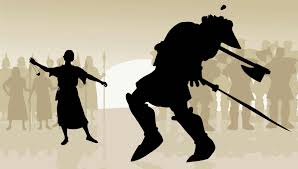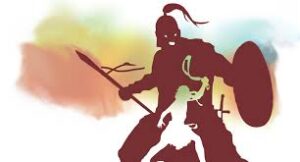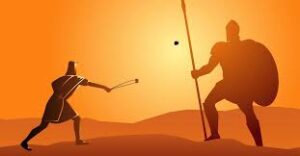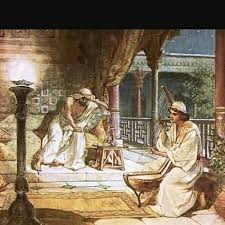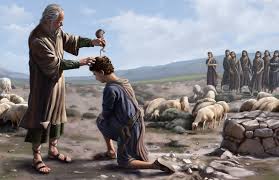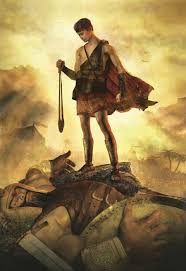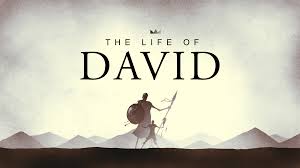Av – David at Nov – First Samuel ch 21: 1-9
David at Nov
First Samuel 21: 1-9
DIG: What did Ahimelek fear? Why? How does David seek to calm his fears? As far as David is concerned, who is “the king” that sent him on an urgent mission? What’s the possible sin involved in consuming the bread of the Presence (Lev 24:9)? Then why did Ahimelek give it to David? What was so special about David carrying Goliath’s sword?
REFLECT: When, if ever, have you experienced the truth that “the fear of the LORD conquers every other fear.” How do you think we develop this good, healthy, fear of ADONAI? Yeshua supported David for eating the consecrated bread. Why? When is it right to disregard sacred rituals (Luke 6:6-9)? You can learn a lot about a person by seeing where they turn in times of trouble. Who do you turn to? With what “sword” has He armed you? What can we learn about David from the way others responded to him?
1015 BC
David went to Nov, which had taken the place of Shiloh as the city of the priests. It was half way between Jerusalem and Sha’ul’s palace at Gibeah (First Samuel 21:1a). That was the place where the Tabernacle had been standing since the destruction of Shiloh and where eighty-six priests lived (First Samuel 22:18-19). Their quietness probably wasn’t disturbed much except for an occasional visitor who came to perform his vows before God. There is no account in First Samuel of the burning of Shiloh (was that even too painful to be remembered?), and there is only one other passage in the TaNaKh that even indirectly indicates what had happened. We read in Psalm 78:60: ADONAI abandoned the tabernacle at Shiloh, the tent He had made where He could live among the people. The same thing happened in Jeremiah’s day, the Temple had become a good luck charm. So what happened to Shiloh happened to the Temple and Jerusalem for the same reason (see the commentary on Jeremiah, to see link click Cc – False Religion is Worthless).78
Just as David had earlier sought the sanctuary with Samuel at Ramah (First Sam 19:18), so now he went to find sanctuary with Ahimelek. David went to Nov to see Ahimelek the priest. The fact that David arrived alone frightened Ahimelek, the high priest, who was a great-grandson of Eli. Ahimelek trembled when he met him, and filled with fear, he asked, “Why are you alone? Why is no one with you?” Because by then it was common knowledge that David commanded Sha’ul’s army and a person of David’s rank would not normally be traveling alone. David answered: The king sent me on a mission and said to me, “No one is to know anything about the mission I am sending you on.” The unnamed “king” here is not Sha’ul, but YHVH, who not only sent David, but also gave him instructions. As for my men, I have told them to meet me at such-and-such place (Hebrew: peloni’almoni). This is a rare Hebrew idiom that is used when one either does not know the name of a person (see the commentary on Ruth Ba – Boaz Obtains the Right of Redemption), or a place (as is the case here with David) when the speaker is deliberately trying to conceal it (First Samuel 21:1b-2). His “army” was not in Ahimelek’s sight, but they were not far away.
“Now then, what do you have on hand? Give me five loaves of bread, or whatever you can find.” But the priest answered David, “I don’t have any ordinary (unconsecrated) bread on hand; however, there is some consecrated bread here.” Because this was holy bread Ahimelek had to make a condition to receive it: “provided the men have kept themselves from women.” War was regarded as sacred, and women were forbidden to men engaged in it. The holy bread could only be eaten by the ritually clean and according to Leviticus 15:16-18 sexual intercourse rendered the couple unclean. David replied, “Indeed women have been kept from us, as usual whenever I set out. The men’s bodies are holy even on missions that are not holy. How much more so today! So the priest gave him the consecrated bread, since there was no bread except the bread of the Presence (see the commentary on Exodus Fo – The Bread of the Presence in the Sanctuary: Christ, the Bread of Life) that had been removed from before ADONAI in the Tabernacle and replaced by hot bread on the day it was taken away on Shabbat (First Samuel 21:3-6).
Since the priestly privileges were for the priests and their families only (Exodus 29:32-33; Leviticus 22:10-16), how could Ahimelek in good conscience give the consecrated bread to David and his men, who were not priests? The answer provided by Yeshua, the authoritative Lord of the Sabbath, seems to be that human need takes priority over the ceremony of the Torah (see the commentary on The Life of Christ Cv – The Son of Man is Lord of the Sabbath).79
In verse 7 the narrative pauses. Now one of Sha’ul’s servants was there that day, detained before the LORD for the fulfillment of a vow or for purification. This was a divine encounter because his presence would lead to the fulfillment of the prophecy concerning the house of Eli. He was Doeg the Edomite, Sha’ul’s chief (Hebrew: abbir meaning violent) shepherd (see Bd – Sha’ul Kills the Priests at Nov). By nationality, he was an Edomite. Therefore, it seems that he was either a convert to Judaism or a mercenary pressed into service as a result of Sha’ul’s wars against Edom (First Samuel 21:7). His presence here is ominous, and is introduced parenthetically in anticipation of his sinister role later.
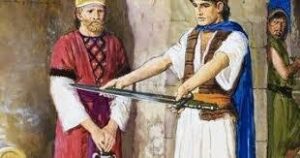
David asked Ahimelek, “Don’t you have a spear or a sword here?” David presumably knew that it was in safe keeping at Nov. “I haven’t brought my sword or any other weapon, because the king’s message was so urgent.” The priest replied, “The sword of Goliath the Philistine, whom you killed in the Valley of Elah, is here; it is wrapped in a cloth (it was customary to wrap in cloths all articles that were especially valuable or sacred) behind the ephod (see the commentary on Exodus Fz – Make the Ephod of Gold, Blue, Purple and Scarlet Yarn). Apparently, David must have dedicated it to the LORD by giving it to the priests. In other words, it was kept in a very secure place, behind the priest’s most important vestments. If you want it, take it; there is no sword here but that one.” David said, “There is none like it, give it to me” (First Samuel 21:8-9). The entire confrontation reflects great haste, urgency . . . and danger. Having accomplished his mission, the young future king dared not linger.



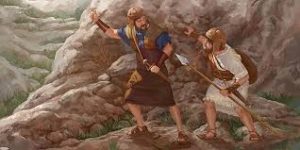
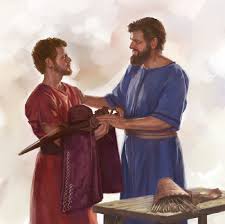
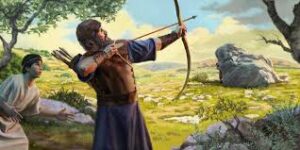

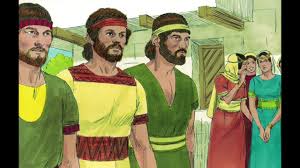
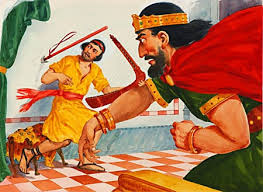

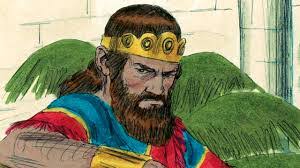 Joyous dancing and singing, accompanied by instrumental music, welcomed the victorious army home, as the women expressed their appreciation of the heroes of the battle. Not surprisingly, David was hailed as the number one hero, while Sha’ul was put in second place, a judgment that he couldn’t handle, but, which annoyed and festered into incurable jealousy. It just ate him up inside. The song was not meant to be derogatory to the king in the process of celebrating the outstanding bravery of David, but, in the light of Samuel’s rejection of Sha’ul (First Samuel 15:1-34), the words seemed to point to David as his replacement. This realization poisoned Sha’ul’s relationship with David from that point forward.46 Sha’ul tried to kill David by using his spear (18:10-16), by the Philistines (18:17-30), by his servants (19:1-7), again by using his spear (19:8-10) and by his messengers (19:11-17).
Joyous dancing and singing, accompanied by instrumental music, welcomed the victorious army home, as the women expressed their appreciation of the heroes of the battle. Not surprisingly, David was hailed as the number one hero, while Sha’ul was put in second place, a judgment that he couldn’t handle, but, which annoyed and festered into incurable jealousy. It just ate him up inside. The song was not meant to be derogatory to the king in the process of celebrating the outstanding bravery of David, but, in the light of Samuel’s rejection of Sha’ul (First Samuel 15:1-34), the words seemed to point to David as his replacement. This realization poisoned Sha’ul’s relationship with David from that point forward.46 Sha’ul tried to kill David by using his spear (18:10-16), by the Philistines (18:17-30), by his servants (19:1-7), again by using his spear (19:8-10) and by his messengers (19:11-17).